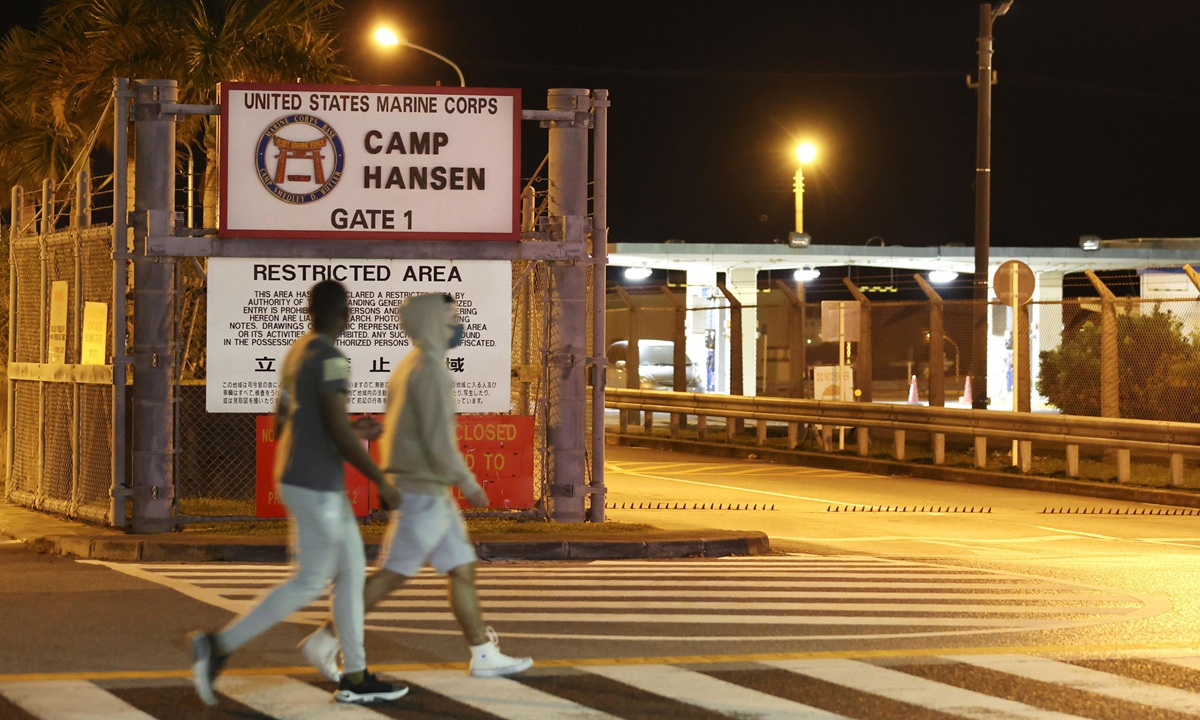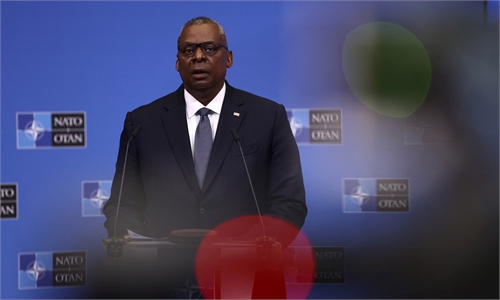
Photo taken on Jan. 6, 2022, shows the U.S. Marine Corps' Camp Hansen in the Okinawa Prefecture town of Kin, southern Japan. A large number of COVID-19 cases were recently reported at the US base. Photo: IC
The US Department of Defense has agreed to keep its troops on bases in Japan and limit activities off installations in South Korea amid surging COVID-19 cases, United Press International reported on Sunday.Can this prevent US troops stationed in the two countries from adding a burden to local practices in preventing the spread of the virus? It probably can't. Given the lax measures and weak awareness of the US in curbing the spread of the coronavirus epidemic, as well as the current inability of Japan and South Korea to change the unequal position in relations with Washington, US troops stationed in Japan and South Korea may still challenge the two East Asian countries' fight against the virus.
According to media reports, US Forces Korea (USFK) reported 682 new cases of COVID-19 for the week ending January 3, a new peak in the coronavirus pandemic for the command responsible for more than 28,500 US troops. Meanwhile, in Japan, outbreaks that began at US military facilities in December 2021 have since spread to the local civilian population.
It can be partly attributed to the fact that both USFK and the US Forces Japan (USFJ) disregarded local quarantine rules. For example, the Korea Herald reported on December 30 that a lack of social distancing and mask wearing were witnessed at a year-end gathering at Camp Humphreys. And USFJ personnel had been exempted from testing for novel coronavirus infections upon departure from the US from September 3. The exemption continued even against the backdrop of Omicron variant raging across the world.
"This once again exposed the problem of the special status of USFK and USFJ. The two are directly regulated by the US. The Japanese and South Korean governments don't have the right to intervene in their activities, although the troops are stationed on the lands of Japan and South Korea," Zhang Tengjun, deputy director of the Department for Asia-Pacific Studies at the China Institute of International Studies, told the Global Times.
In this context, it is not uncommon to see US troops stationed in Japan and South Korea ignore local laws and regulations and cause trouble to the normal lives of local people. For instance, in 2017, a US Marine in Okinawa was arrested and charged by local police for suspicion of negligent driving resulting in injury or death and driving under the influence of alcohol.
From the perspective of international relations, all countries enjoy sovereign equality. Japan and South Korea should have enjoyed an equal status with the US. But the problem lies in that Japan and South Korea dare not meddle in US military bases and their management and must sacrifice or compromise something.
Outwardly, what Japan and South Korea have sacrificed is the right to manage the US forces stationed on their lands. But in the end, the sacrifice is actually the health or even lives of ordinary Japanese and South Korean people, especially those living near the US military bases.
It is a reminder to the Japanese and South Korean governments that they should try to get more involved in the management of the US troops stationed in Japan and South Korea and urge them to address their problems. After all, where the US forces are stationed are Japanese and South Korean territories, not the US'. They should be serving their nationals, not American troops.
Furthermore, the world has witnessed that the US response to the epidemic has been a complete failure. The US has a lack of appropriate awareness and measures to prevent the spread of the virus. This means its troops stationed overseas should do a better job. Although the Pentagon has agreed with Tokyo and Seoul to limit its troops' travels and activities, the effect will be limited. The news that USFJ or USFK complicates the fight of Japan or South Korea against the epidemic is anticipated to be heard again.


